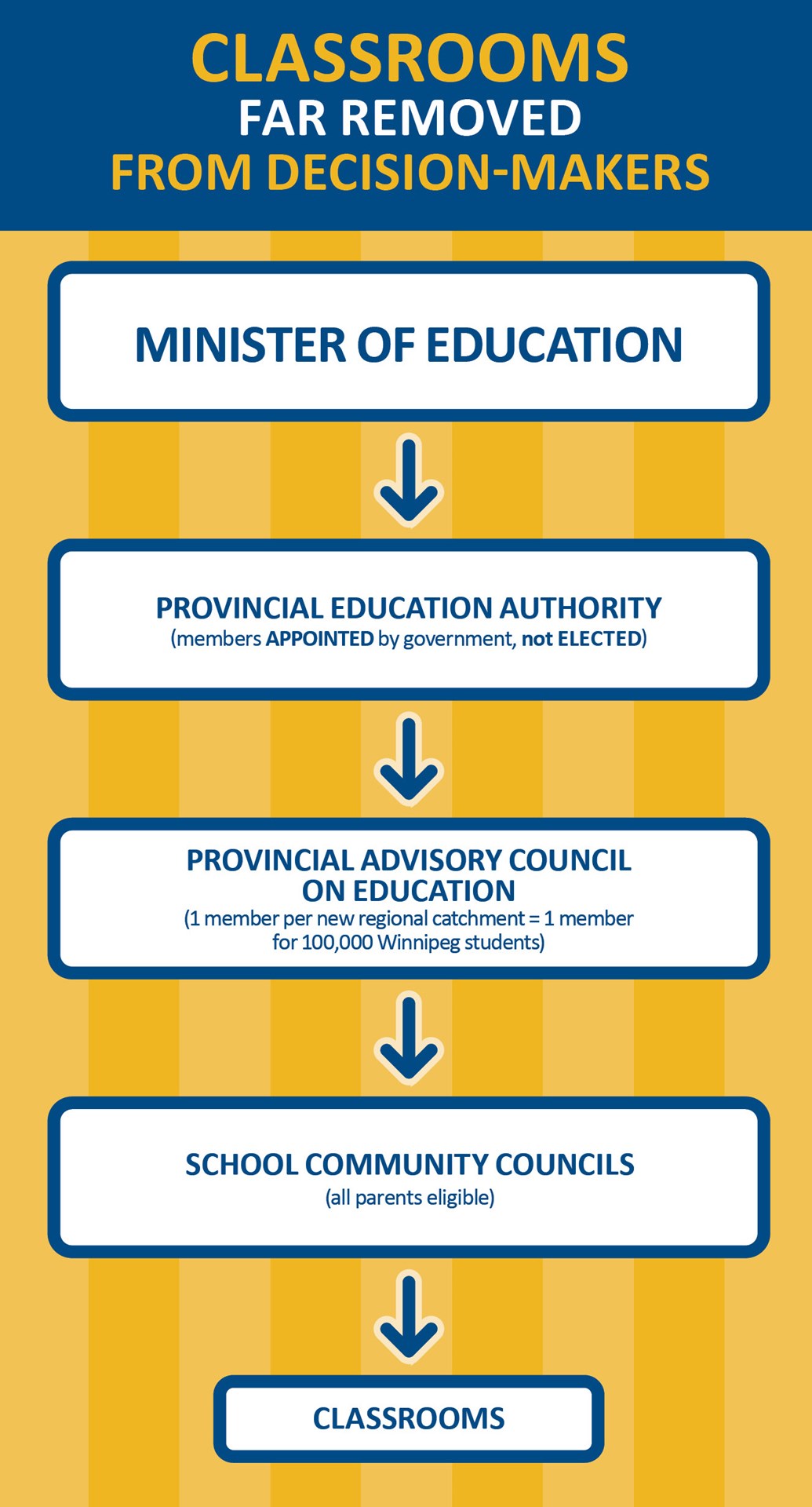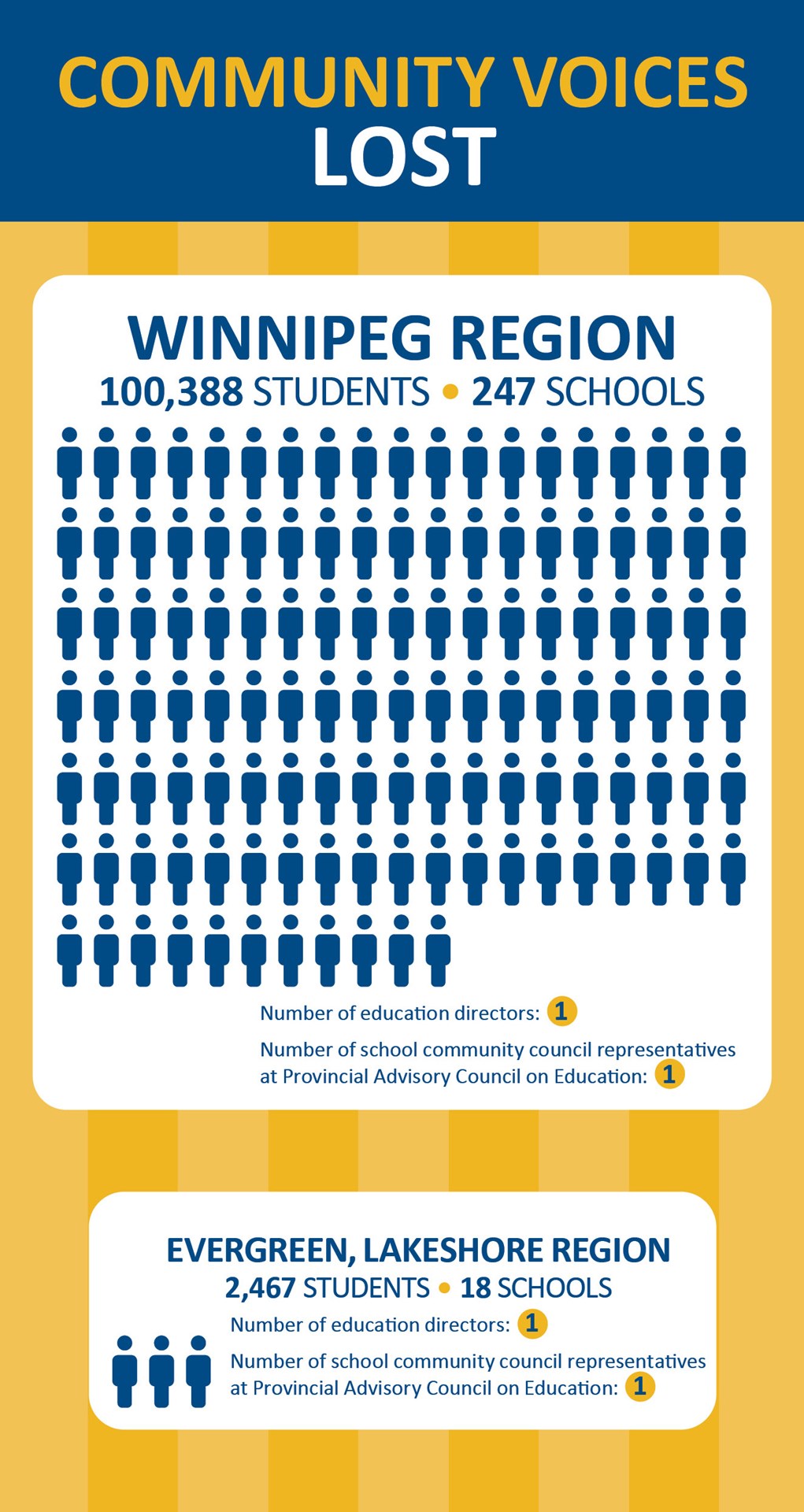Manitoba K–12 Education Review

 Bill 64 has been pulled by government. Without the strong advocacy of our parent community and others, this would not have been possible, and the quality of our schools' programs, supports, and services would have been at stake. We thank you for your support and for your efforts to keep the individual and community voice at the heart of our school system. Keep in mind that education reform may still be around the corner. See below for the facts of where we've been and where we could potentially go.
Bill 64 has been pulled by government. Without the strong advocacy of our parent community and others, this would not have been possible, and the quality of our schools' programs, supports, and services would have been at stake. We thank you for your support and for your efforts to keep the individual and community voice at the heart of our school system. Keep in mind that education reform may still be around the corner. See below for the facts of where we've been and where we could potentially go.
WHAT IS BILL 64?
Bill 64 will create a centralized, politically driven system where the needs of students will be far removed from the people making decisions about what happens in the classroom.
It will not help students in RETSD, or elsewhere in Manitoba, to learn better, achieve success or become good citizens. Instead, if Bill 64 is enacted, we believe it will take the focus away from individual students and their needs and replace local voice and choice with one-size-fits-all programming. Equally concerning is the government's focus on standardized testing—which is a misleading and inaccurate way to measure how students are doing in school.
1. Bill 64 is anti-democratic and removes local voice and choice
Bill 64 will eliminate all democratically elected school boards and centralize Manitoba's 37 English school divisions into 15 regional catchments. All school divisions in Winnipeg will become one large region. Centralization will lead to the loss of local voice and choice. With all Winnipeg area schools competing for funding and resources, unique and culturally relevant programs can disappear, such as heritage language programs, like German and Ukrainian, and apprenticeship programs offered in community partnerships. Local interests and needs may be replaced with standardized programs across Winnipeg, whether they are relevant or appropriate to the school community.
2. Unrealistic expectations of parents
Bill 64 proposes that any parent with a child registered in a public school is considered a member of a School Community Council associated with that school. The way the bill is written, these councils will advise the school principal on various important issues. This fails to consider the time parents already spend with their own families and work. In many cases, only a few parents will have the time needed for all the tasks expected of the councils and that means many parents will be left out of important decisions. Since the mandate of the councils is stated as "may" advise, not "shall" advise, perhaps the government really is not concerned about what the councils have to say and will only listen to the final decision-maker, the Provincial Education Authority.
Even without the vagueness of the wording, what parents "may" be involved in is concerning. Parents will be asked to advise on such issues as staffing, how well students are doing in school, the effectiveness of the programming at the school, and transportation options. Every parent has a legitimate opinion on these matters, but their educational background and experience may not be suited to advising on such significant issues. Their advice and input also may be influenced by concerns about their own child and any issues she or he may experience at school. This can make it difficult to be impartial with advice about staffing, student achievement or school programs. We wouldn't ask a non-healthcare professional to make hiring or other decisions about physicians or nurses. Likewise, it makes little sense to ask parents, many of whom will not have an education background, to give an impartial evaluation of a principal, staff, and school programs. These decisions could affect the school long past the time the parent has a child registered there.
3. Education review recommendations ignored
The comprehensive education review held in 2019 resulted in 75 recommendations for six different themes, including a vision for public education, student learning, teaching, governance, and funding. Despite the hundreds of submissions to the review from a broad range of organizations and individuals, Bill 64 focuses solely on governance. We wonder if the government simply doesn't care about the other critical themes, such as how to ensure the best outcomes for students and strengthening teacher training, or if it chose to ignore the input of Manitobans and proceed with its own plans.
There are many factors that help student learning. Students succeed when they have good student/teacher relationships, locally relevant programming, and resources directed to the classrooms. The focus in Bill 64 on governance ignores the opportunities to strengthen student success and, worse, will remove local voice and choice, putting unique programming at risk.
There also are many factors that hinder student learning. Children who come to school hungry, who have food or housing insecurity, or who are vulnerable for other reasons are going to have more challenges in learning. Manitoba has the highest child poverty rate among all provinces and is 10.1 per cent above the national rate. It is well known that poverty can have a direct, negative effect on student success. For many years, our board and other Manitoba divisions have asked the government to work with agencies to address poverty. Now, when the government plans to dismantle democratically elected local school boards and move decision-making far from communities, the government promotes its Poverty Task Force. Why is this being done now when local voices and local knowledge about socio-economic issues will no longer be involved? We are concerned the only message we hear from the government is how Bill 64 will improve education and yet it ignores the factors that will help students succeed and offers no indication of support for vulnerable students.
https://campaign2000.ca/wp-content/uploads/2020/12/Manitoba-Poverty-Central-2020-Report-Update-1.pdf
4. Better education started years ago
Messages in support of Bill 64 suggest it will make education better starting now. This is an affront to educators who have helped thousands of Manitoba students succeed and become good—even exceptional—citizens. In fact, education is always improving as we learn new ways to support students. This means we are building on strengths. It does not mean what exists is broken. Bill 64 will not start making education better.
LEARN MORE ABOUT BILL 64
Bill 64 doesn't make the grade. The RETSD Board of Trustees encourages you to learn more about the bill. You can read it at: web2.gov.mb.ca/bills/42-3/b064e.php
For more information, please see the links below:
Manitoba's K to 12 Education Action Plan
Read the Report of the Commission on K–12 Education
Letter from Board to Parents/Community (March 26, 2021)
Letter from Board to MLAs (May 20, 2021)
Letter from Board to Premier (May 20, 2021)
Community Conversation with Dr. Wiens on Bill 64—Hear How Some Elements are Concerning from Students and Parents
MEDIA
Bill 64: A Rock and a Hard Place
Bill 64 Undermines Public Education
Ed. Budget Partially Funded by Raising Property Taxes
Americanizing Education is Pure Folly
Expertise Should Guide Schools Plan
‘Better Education’ Started Many Years Ago
Tories Accused of Politicizing Education
School Divisions, Public Speaking Out Against Bill 64
Bill 64 Opposition Not Just a 'Vocal Minority'


